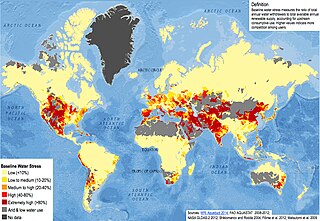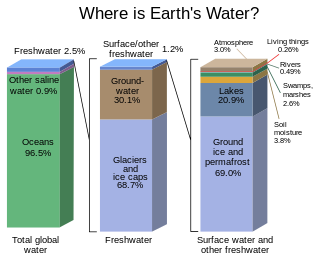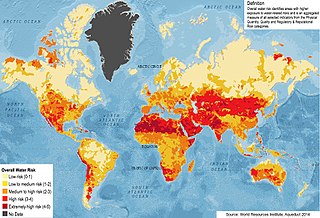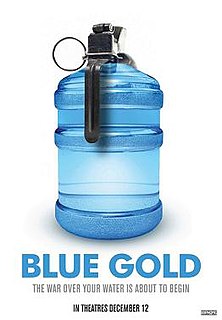
Water is an inorganic, transparent, tasteless, odorless, and nearly colorless chemical substance, which is the main constituent of Earth's hydrosphere and the fluids of all known living organisms. It is vital for all known forms of life, even though it provides no calories or organic nutrients. Its chemical formula is H2O, meaning that each of its molecules contains one oxygen and two hydrogen atoms, connected by covalent bonds.

A drought is an event of prolonged shortages in the water supply, whether atmospheric, surface water or ground water. A drought can last for months or years, or may be declared after as few as 15 days. It can have a substantial impact on the ecosystem and agriculture of the affected region and harm to the local economy. Annual dry seasons in the tropics significantly increase the chances of a drought developing and subsequent bush fires. Periods of heat can significantly worsen drought conditions by hastening evaporation of water vapour.

Drinking water, also known as potable water, is water that is safe to drink or use for food preparation. The amount of drinking water required to maintain good health varies, and depends on physical activity level, age, health-related issues, and environmental conditions. On average, people in the United States generally drink one litre of water per day and 95% drink less than three litres per day. For those who work in a hot climate, up to 16 litres a day may be required.

Tap water is water supplied to a tap (valve). Its uses include drinking, washing, cooking, and the flushing of toilets. Indoor tap water is distributed through "indoor plumbing", which has existed since antiquity but was available to very few people until the second half of the 19th century when it began to spread in popularity in what are now developed countries. Tap water became common in many regions during the 20th century, and is now lacking mainly among people in poverty, especially on Indian Reservations in the US and in developing countries.

Maude Victoria Barlow is a Canadian author and activist. She is a founding member of the Council of Canadians, a citizens' advocacy organization with members and chapters across Canada. She is also the co-founder of the Blue Planet Project, which works internationally for the human right to water. Barlow chairs the board of Washington-based Food & Water Watch, is a founding member of the San Francisco–based International Forum on Globalization, and a Councillor with the Hamburg-based World Future Council. In 2008/2009, she served as Senior Advisor on Water to the 63rd President of the United Nations General Assembly and was a leader in the campaign to have water recognized as a human right by the UN.

Global change refers to planetary-scale changes in the Earth system. The system consists of the land, oceans, atmosphere, polar regions, life, the planet's natural cycles and deep Earth processes. These constituent parts influence one another. The Earth system now includes human society, so global change also refers to large-scale changes in society and the subsequent effects on the environment.

Tony Clarke is a Canadian activist. He grew up in Chilliwack, British Columbia, graduating from Chilliwack Senior Secondary School in 1962. He was class president. He studied at the University of British Columbia and did graduate work at the University of Chicago, obtaining a PhD in the history of religion. He presented a dissertation titled The Color Line and the American Metropolis: A Search for a Form of Ministry in the Aftermath of the Civil Rights Movement in Chicago (1974). After Chicago, he worked for the Canadian Conference of Catholic Bishops for 21 years, serving as Director of Social Policy.
The World Water Council (WWC) is an international think tank founded in 1996, with its headquarters in Marseille, France. It has 358 members which include organisations from the UN and intergovernmental organizations, the private sector, governments and ministries, academic institutions, international organizations, local governments and civil society groups. Founders and constituent members of the World Water Council include the International Commission on Irrigation and Drainage, the International Union for the Conservation of Nature (IUCN), the International Water Association (IWA), AquaFed, Suez Lyonnaise des Eaux, the United Nations agencies UNDP and UNESCO, as well as the World Bank.

The Council of Canadians is a non-profit organization that advocates for clean water, fair trade, green energy, public health care, and a vibrant democracy. The organization is headquartered in Ottawa, Ontario with regional offices in Halifax, Toronto, Edmonton and Vancouver and a network of local chapters across the country.

Water scarcity is the lack of fresh water resources to meet the standard water demand. Humanity is facing a water crisis, due to unequal distribution resulting in some very wet and some very dry geographic locations, plus a sharp rise in global freshwater demand in recent decades driven by industry. Water scarcity can also be caused by droughts, lack of rainfall, or pollution. This was listed in 2019 by the World Economic Forum as one of the largest global risks in terms of potential impact over the next decade. It is manifested by partial or no satisfaction of expressed demand, economic competition for water quantity or quality, disputes between users, irreversible depletion of groundwater, and negative impacts on the environment. Two-thirds of the global population live under conditions of severe water scarcity at least 1 month of the year. Half a billion people in the world face severe water scarcity all year round. Half of the world's largest cities experience water scarcity.

Peak water is a concept that underlines the growing constraints on the availability, quality, and use of freshwater resources.

Water resources are natural resources of water that are potentially useful. Uses of water include agricultural, industrial, household, recreational and environmental activities. All living things require water to grow and reproduce.
As Australia's supply of freshwater is increasingly vulnerable to droughts, possibly as a result of climate change, there is an emphasis on water conservation and various regions have imposed restrictions on the use of water.

Water security has been defined as "the reliable availability of an acceptable quantity and quality of water for health, livelihoods and production, coupled with an acceptable level of water-related risks". It is realised to the degree that water scarcity is non-existent, or has been decreased or eliminated, and to the degree that floods and contamination of freshwater supplies are non-threatening.
"Sustainable development will not be achieved without a water secure world. A water secure world integrates a concern for the intrinsic value of water with a concern for its use for human survival and well-being. A water secure world harnesses water's productive power and minimises its destructive force. Water security also means addressing environmental protection and the negative effects of poor management. It is also concerned with ending fragmented responsibility for water and integrating water resources management across all sectors—finance, planning, agriculture, energy, tourism, industry, education and health. A water secure world reduces poverty, advances education, and increases living standards. It is a world where there is an improved quality of life for all, especially for the most vulnerable—usually women and children—who benefit most from good water governance."

Blue Gold: World Water Wars is a 2008 documentary film directed, co-produced, and co-written by Sam Bozzo, based on the book Blue Gold: The Fight to Stop the Corporate Theft of the World’s Water by Maude Barlow and Tony Clarke.

Water on the Table is a Canadian documentary film directed, produced and written by filmmaker Liz Marshall. The film explores Canada's relationship to its freshwater resources and features Canadian activist Maude Barlow in her pursuit to protect water from privatization. Counterbalancing Barlow's views are those of policy and economic experts who assert that water is a resource and a commodity like any other.
Blue Gold is a novel by Clive Cussler and Paul Kemprecos published in 2000.

Water production and consumption growth rates is key for African countries to achieve efficient and equitable allocation of these resources.
James S. (Jay) Famiglietti is the director of the Global Institute for Water Security at the University of Saskatchewan in Saskatoon, Canada. Prior to that he was the Senior Water Scientist at NASA Jet Propulsion Laboratory in Pasadena, CA and a professor of Earth System Science at the University of California, Irvine. He is a leading expert in global water issues and in raising awareness about the global water crisis and in particular, about global groundwater depletion.
The University of California Center for Hydrologic Modeling (UCCHM) is a campus-wide hydrologic modeling research center, located at the University of California, Irvine. The models and modeling frameworks developed at the Center address the urgent environmental and health issues related to water availability, such as how water availability will change in response to external factors like global climate change, how water availability will change with diminishing snow and ice, and how the frequency of hydrologic extremes will affect the state of California The UCCHM team, made up of faculty, researchers and students, is working towards creating a state-of-the-art integrated model of California water resources that can influence and inform leaders of local, state and regional governments when making water management decisions.














